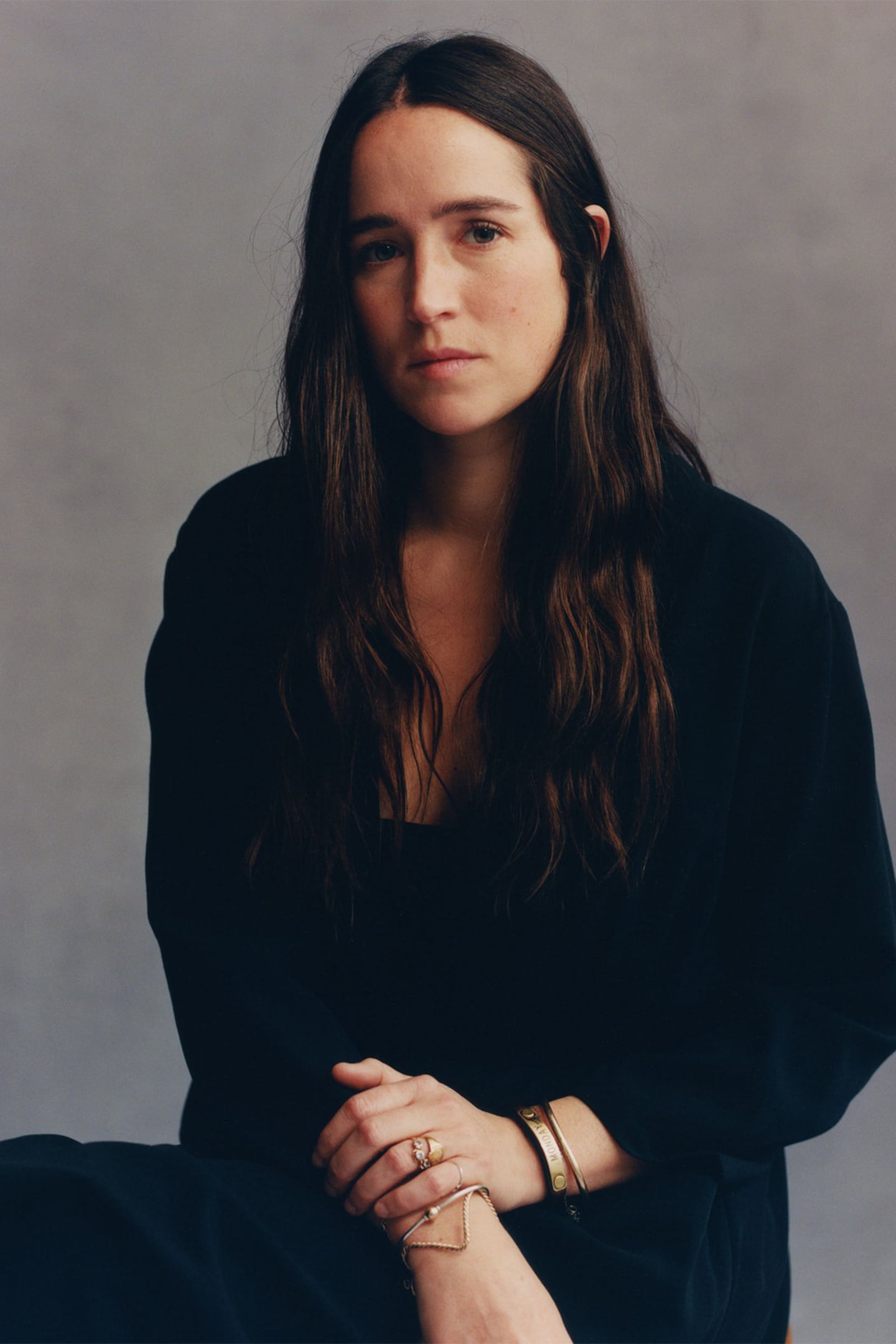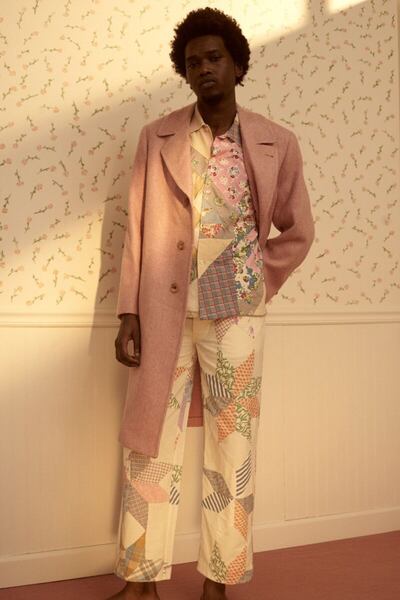
The Business of Fashion
Agenda-setting intelligence, analysis and advice for the global fashion community.

Agenda-setting intelligence, analysis and advice for the global fashion community.

Since founding Bode in 2016, New York-based menswear designer Emily Adams Bode has been carefully building a collection of garments designed with history in mind, whether that’s the history of the material she uses — sometimes antique — or the history of the silhouette. Her most striking pieces are often illustrated with patchwork and needlework motifs, customised to tell the buyer’s own personal history.
With the brand, she’s also writing the next chapter of her own family’s story.
Many fashion labels begin life as family businesses, but often become something else entirely as they grow, drafting in external investors and professional managers. Emily Adams Bode and her partners, husband Aaron Aujla and brother-in-law Dev Aujla, are set on keeping Bode family-run.
“We’re creating a business that can last for generations,” Bode told BoF a few weeks before the opening of her Los Angeles store, the brand’s second retail concept. “Six years after starting, we’re holding out on everything from partnerships, to collaborations, to working with investors, to [accelerating] wholesale so that we can grow as slowly and strong as we possibly can.”
ADVERTISEMENT

Bode’s first retail location in Manhattan’s Chinatown, which opened in November 2019 and includes an alterations shop and coffee kiosk, has become a gathering place for the neighbourhood’s residents, as well as a destination for the fashion-obsessed, from art school kids to young bankers moving on from hypebeast culture.
“It’s difficult for a small brand to create a world, create a vibe, and she was really able to do that,” said menswear guru Josh Peskowitz, an operating partner at New York-based investment firm Untitled Group. “These big world-building exercises take so much money and infrastructure — she’s proven it’s possible on a smaller scale.”
The homey, wood-panelled Chinatown space, designed by Aaron Aujla’s Green River Project, gave the brand a leg up during the pandemic as visits to the shop drove online sales and vice versa. So much that direct-to-consumer sales, including e-commerce, accounted for 70 percent of revenue in 2021, up from 50 percent in 2020.
While Dev Aujla, CEO of both Bode and Green River Project, declined to share sales figures, he said that Bode’s wholesale channel grew during that period as well, up to 105 accounts in 2021 from 18 in 2018. (Sales from the made-to-order business, which operates out of the tailor shop, were up 120 percent from a year earlier).
The Los Angeles store, once again designed by Green River Project, is located at 7007 Melrose Avenue near the Sycamore District, which has become a destination neighbourhood with the relocation of luxury boutique Just One Eye and the opening of several notable restaurants, including celebrity-magnet Gigi’s.
The choice to open a shop in Los Angeles was obvious to Bode as the city is its second-largest market in the US. (London, where it’s sold at several stores, is its other major market.) Aujla said that, given the performance of the outpost in New York, investing in more retail made sense for the business despite the capital requirements.
“We’ve basically been profitable from the get-go,” he said. “We operate from our cash flow.”
When Bode started the self-funded label in 2016, they faced the challenge of scaling a brand that, at the time, only offered one-off designs, often created with dead stock or antique fabrics. But they’ve managed to grow without tripping up by sticking to a manageable pace and doing what Peskowitz refers to as “not replicable, but repeatable,” meaning that most garments are not exactly the same, but are made in a way that is possible to do over and over again. (For instance, one of the brand’s open-collar shirts can be rendered in a variety of materials.)
ADVERTISEMENT
Over the years, Bode, which draws heavily on traditional quilting and other age-old sewing techniques, has become emblematic of a certain aesthetic, influencing the menswear and wider fashion markets. These days, copycats and watered-down versions of her aesthetic abound, though Bode is certainly not the first designer to embrace this style.
“The people and the brands that I have always looked up to are successful in that they were able to shift the way people dress and the way people shop,” Bode said. “In some ways, I’m completely honoured and flattered that I’ve been able to do that ... What I get saddened by is some of these techniques become simply trend-based.”
Preservation is the overarching narrative.
It’s Bode’s methodological approach, which takes into consideration the provenance of the materials and also the history of the silhouettes she’s reconstructing, that differentiates her from many competitors. One of the company’s biggest investments, for example, is in its fabric archive.
“Preservation is the overarching narrative,” she said. “The goal of the business, as somebody who makes clothing, is to be able to share that knowledge in a way that people celebrate that preservation and continue on the legacy.”
Bode’s emphasis on upcycling is, in part, driven by a desire to reduce the environmental impact of creating new materials. But she is equally focused on building a business that is sustainable from a cash-flow perspective.
To Bode and Aujlas, that means saying no to things like collaborations, as well as investment opportunities that could make certain goals, like developing the fabric archive, happen more quickly.
Right now, in addition to launching its new store, the company is focused on preserving sewing and embroidery skills that might be lost in the next generation. Aujla said that the majority of the company’s investment over the next year will be on increasing domestic production, which currently makes up 40 percent of the label’s overall output.
Without the outside investor pressure to grow rapidly, Aujla said that the business can continue to hire unique talent eager to work for a brand that wants to do things differently. He cited the group of seven illustrators working on the 50-person team (up from five, pre-pandemic) who help bring customers’ stories to life on custom Bode pieces.
ADVERTISEMENT
“Somewhere that you get to draw and interview people as your job, that doesn’t really exist elsewhere,” he said.
Editor’s Note: This story was corrected on February 10, 2021. A previous version misstated that Catalog, LLC, Dev Aujla’s investment and advisory firm, backs Bode. This is incorrect. The business is self-funded.
Young fashion designers should be free to imitate others, argues Eugene Rabkin.
The Los Angeles-based accessories label has been a well-kept secret in the industry, but founders Yang Pei and Stephanie Li are hoping to change that through new acquisitions, opening brick-and-mortar stores and using AI to speed up the design and production process.
Designer Carly Mark sparked conversation about what it takes to make it as an emerging designer in New York when she announced she was shutting her ready-to-wear line and moving to London. On Thursday she held her last sample sale.
To stabilise their businesses brands are honing in on what their particular consumer wants to buy, introducing new categories and starting conversations.
That’s the promise of Zellerfeld, a 3D-printing partner to Louis Vuitton and Moncler that’s becoming a platform for emerging designers to easily make and sell footwear of their own.